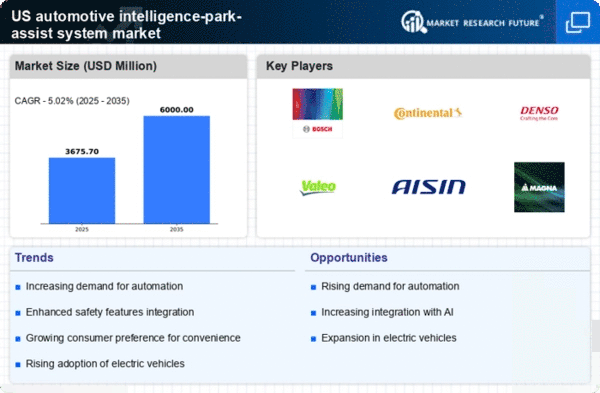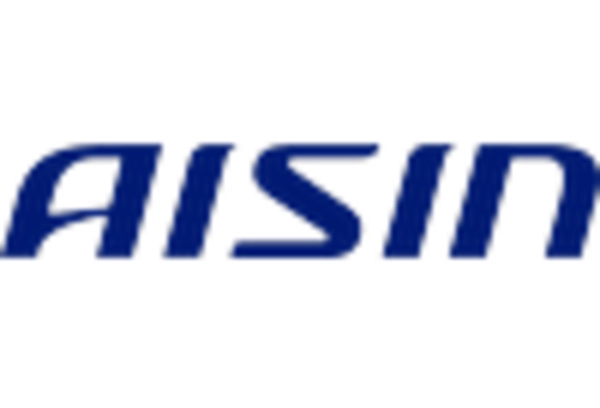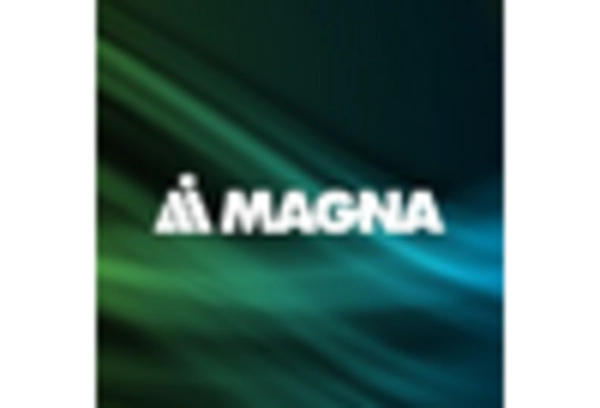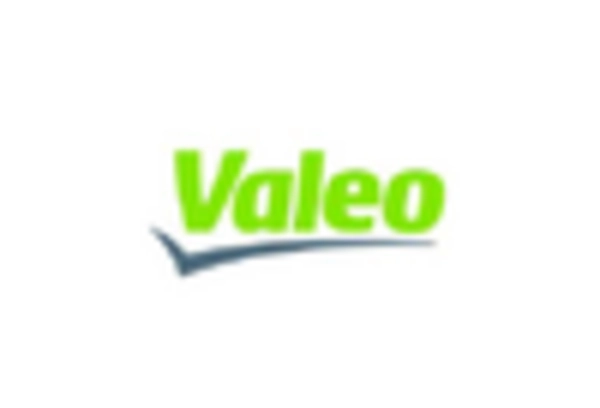Rising Urbanization
The increasing trend of urbanization in the US is a pivotal driver for the automotive intelligence-park-assist-system market. As more individuals migrate to urban areas, the demand for efficient parking solutions intensifies. Urban environments often present challenges such as limited parking space and high vehicle density, necessitating advanced parking assistance technologies. According to recent data, urban areas are projected to house approximately 85% of the US population by 2030, which could lead to a surge in the adoption of intelligent parking systems. These systems not only enhance convenience but also contribute to reducing traffic congestion, thereby appealing to city planners and consumers alike. Consequently, the automotive intelligence-park-assist-system market is likely to experience substantial growth as urbanization continues to shape transportation needs.
Government Initiatives and Funding
Government initiatives and funding play a vital role in shaping the automotive intelligence-park-assist-system market. Various federal and state programs are being implemented to promote the development and adoption of smart transportation technologies. For instance, the US Department of Transportation has allocated substantial funds to support research and development in intelligent transportation systems, including parking assistance technologies. This financial backing not only fosters innovation but also encourages collaboration between public and private sectors. As these initiatives gain momentum, the automotive intelligence-park-assist-system market is expected to experience accelerated growth, driven by enhanced investment and support for advanced parking solutions.
Consumer Preference for Convenience
Consumer preferences are shifting towards convenience and ease of use, which significantly impacts the automotive intelligence-park-assist-system market. Modern consumers increasingly seek features that simplify their driving experience, particularly in urban environments where parking can be a hassle. Surveys indicate that over 70% of drivers express a desire for automated parking solutions that minimize the stress associated with finding parking spaces. This growing inclination towards convenience is driving manufacturers to incorporate advanced parking assist technologies into their vehicles. As a result, the automotive intelligence-park-assist-system market is likely to witness increased demand as consumers prioritize features that enhance their overall driving experience.
Technological Integration in Vehicles
The integration of advanced technologies in vehicles is a significant driver for the automotive intelligence-park-assist-system market. Innovations such as artificial intelligence, machine learning, and sensor technologies are increasingly being incorporated into vehicles, enhancing their parking capabilities. For instance, the use of ultrasonic sensors and cameras allows for precise maneuvering in tight spaces, which is particularly beneficial in urban settings. The market for automotive sensors is expected to reach $30 billion by 2026, indicating a robust growth trajectory. This technological evolution not only improves user experience but also aligns with consumer expectations for smart vehicle features. As automakers continue to invest in these technologies, the automotive intelligence-park-assist-system market is poised for expansion.
Environmental Concerns and Sustainability
Environmental concerns are becoming a crucial driver for the automotive intelligence-park-assist-system market. As awareness of climate change and urban pollution rises, there is a growing emphasis on sustainable transportation solutions. Intelligent parking systems can contribute to reduced emissions by optimizing parking space usage and minimizing the time vehicles spend idling while searching for parking. The US government has set ambitious targets to reduce greenhouse gas emissions, which may further encourage the adoption of technologies that promote efficient vehicle operation. Consequently, the automotive intelligence-park-assist-system market is likely to benefit from this shift towards sustainability, as consumers and policymakers alike seek solutions that align with environmental goals.
















